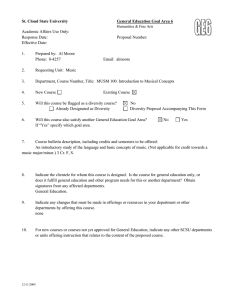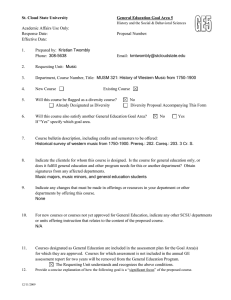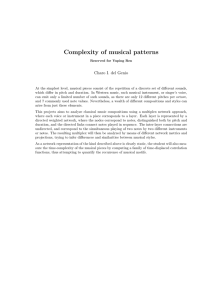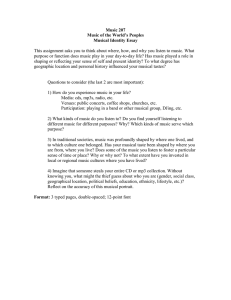St. Cloud State University General Education Goal Area 6
advertisement
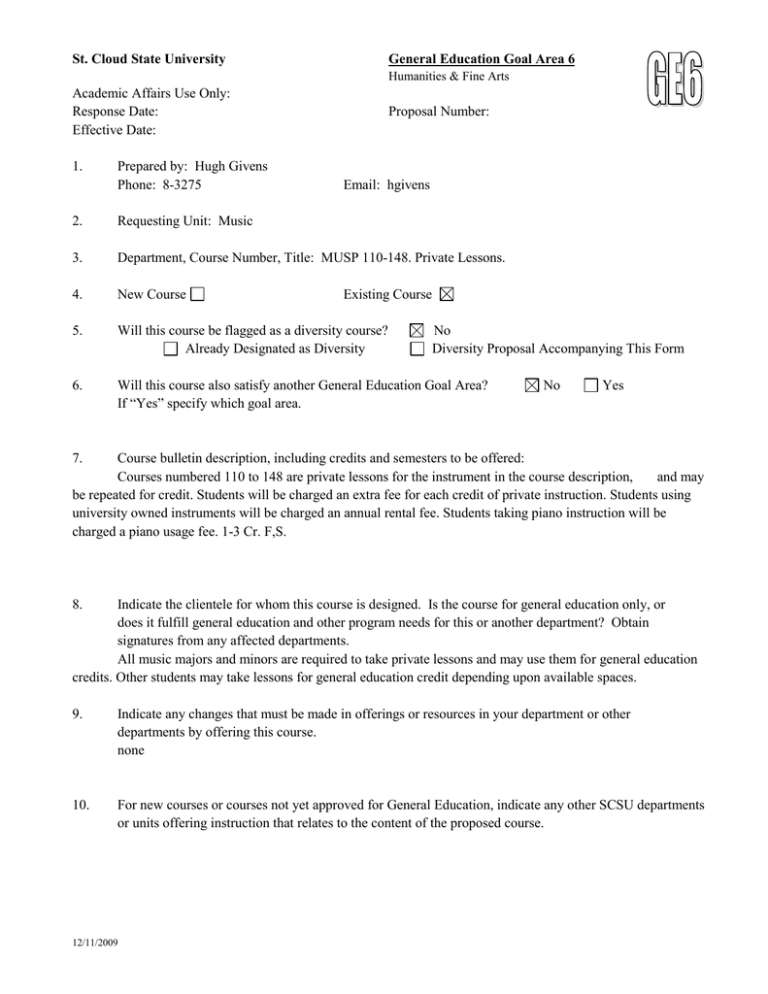
St. Cloud State University General Education Goal Area 6 Humanities & Fine Arts Academic Affairs Use Only: Response Date: Effective Date: 1. Prepared by: Hugh Givens Phone: 8-3275 Proposal Number: Email: hgivens 2. Requesting Unit: Music 3. Department, Course Number, Title: MUSP 110-148. Private Lessons. 4. New Course 5. Will this course be flagged as a diversity course? Already Designated as Diversity 6. Will this course also satisfy another General Education Goal Area? If “Yes” specify which goal area. Existing Course No Diversity Proposal Accompanying This Form No Yes 7. Course bulletin description, including credits and semesters to be offered: Courses numbered 110 to 148 are private lessons for the instrument in the course description, and may be repeated for credit. Students will be charged an extra fee for each credit of private instruction. Students using university owned instruments will be charged an annual rental fee. Students taking piano instruction will be charged a piano usage fee. 1-3 Cr. F,S. 8. Indicate the clientele for whom this course is designed. Is the course for general education only, or does it fulfill general education and other program needs for this or another department? Obtain signatures from any affected departments. All music majors and minors are required to take private lessons and may use them for general education credits. Other students may take lessons for general education credit depending upon available spaces. 9. Indicate any changes that must be made in offerings or resources in your department or other departments by offering this course. none 10. For new courses or courses not yet approved for General Education, indicate any other SCSU departments or units offering instruction that relates to the content of the proposed course. 12/11/2009 11. Courses designated as General Education are included in the assessment plan for the Goal Area(s) for which they are approved. Courses for which assessment is not included in the annual GE assessment report for two years will be removed from the General Education Program. The Requesting Unit understands and recognizes the above conditions. 12/11/2009 12. Provide a concise explanation of how the following goal is a “significant focus” of the proposed course. Goal Area 6: Humanities & Fine Arts Expand appreciation and critical understanding of changing modes of human expression and systems of thought in the arts and humanities, and develop abilities in the creation and performance of meaning. Students study and perform a vast range of repertoire from diffrerent hisorical periods and multifarious cultural influences. Students learn cultural and historical contexts and environs in which the music was created. Interdisciplinary confluences are made when particular works are inspired by other art forms such as literature, visual art, dance, and other cultural traditions. 13. In order for a course to be designated as fulfilling Goal Area 6, it must address at least 5 of the 7 student learning outcomes (SLOs) below. Check the SLOs below that are focused on in the proposed general education course. 1. Demonstrate awareness of the scope and variety of works in the arts and humanities. 2. Describe and appreciate works in the arts and humanities as expressions of individual and collective values within an intellectual, cultural, historical and social context. 3. Interpret and respond critically to works from various cultures in the arts and humanities. 4. Explore intellectually the ideas expressed in works in the arts and humanities. 5. Engage in creative processes or interpretive performance. 6. Articulate an informed personal response to works in the arts and humanities. 7. Analyze the diverse means of communication in the arts and humanities. 14. Discuss how each Student Learning Outcome checked above is achieved in this course. (Note: Although descriptions of typical assignments or types of assignments may be part of this discussion, it is not appropriate to submit copies of actual assignments.) 2. Through their applied study students develop an appreciation for a wide range of music spanning c. 300 years and encompassing a broad spectrum of nationalistic styles. Through this intimate hands-on experience of preparation and performance of masterworks, students develop a deeper appreciation and understanding of the qualities that define a great work of musical art. Interdisciplinary connections are an important part of musical understanding for appropriate performance. Students learn about the historical and cultural setting in which musical works were written or performed, as well as appropriate performance practice within a given musical tradition. They may also learn about cultural traditions, literature, or visual art works that inspired a particular piece of music. 3. Critical and analytical thinking are needed to interpret a musical work and perform it consistently well. Students discover the formal construction of a piece and analyze how that structure influences the story it tells or the emotional journey it portrays. Each student must also develop critical listening skills to understand musical meaning and make judgments about appropriate musical interpretation and performance. Students develop highlevel critical listening skills in comparing their own actual performance with an ideal, developed through their 12/11/2009 own interpretive skills and/or presented to them by the instructor. They must constantly assess whether their performance matches this ideal and prescribe remedies, such as more correct intonation, more precise rhythm, or more appropriate articulation of the text. 4.Through the detailed study, preparation and mastery of a variety of musical compositions, students develop the ability to analyze and understand the composer’s creative process as well as an appreciation for the uniqueness of each composer’s musical language. The development of mature performance skills requires an ongoing critical assessment of the music, which includes comprehending the composer’s musical intent through the analysis of phraseology, harmonic language, small and large forms, dynamic and stylistic contrasts and other nuances. 5. The preparation and performance of a musical work involves seeking to understand the composer’s intent and attempting to be faithful to that intent. Nevertheless, much is still left to the performer’s creativity in the shaping of the music. No two performances are or should be exactly the same. 6. Students will attend a variety of performance venues, including departmental convocations, studio classes, recitals, and concerts, thereby developing refined listening skills and an ability to intelligently discuss/critique musical performance. 15. List or attach the Course Outline (adequately described and including percentage of time to be allocated to each topic). Curriculum Committees may request additional information. Topics larger than 20% need to be broken down further. Indicate in your course outline where the Student Learning Outcomes checked above are being met. 10% Research and study historical context of compositions. (goals 2,3) 10% Research and study history and contributions of major composers. (2,3) 20% Analyze compositions musically and when appropriate, textually. (3,4,5) 10% Music and text. 10% Performance practice. 20% Final performance of compositions and techniques studied. (5) 10% Jury 10% Public performance 10% Students will attend and review live performances. (6) 5% Convocations 5% Recitals and concerts 30% Technical proficiency on instrument 10% Tone Production 10% Intonation 10% Facility 12/11/2009 St. Cloud State University General Education Transmittal Form Academic Affairs Use Only: Response Date: Effective Date: Proposal Number Department: MUSIC Course or Course(s): MUSP 110-148. Private Lessons Department or Unit Chair Signature Date Department forward to Academic Affairs for publication and electronically to Chair of General Education Committee, Chair of College Curriculum Committee, College Dean Recommendation of General Education Committee: Approve Remarks: Disapprove Chairperson Committee Signature Date Recommendation of University Curriculum Committee: Approve Remarks: Disapprove Chairperson Committee Signature Date Recommendation of Faculty Association: Approve Remarks: Disapprove FA Senate Signature Date Action of Academic Vice President: Approve Disapprove Signature Entered in Curriculum Data File 12/11/2009 Remarks: Date
